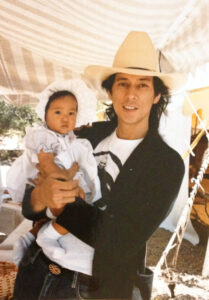Tchin <<chin>> is an artist and metalsmith. He’s created designs for brands like Cartier <<CAR-tee-yay>>.
He belongs to the Narragansett tribe. Growing up, he moved between foster homes in Rhode Island and Virginia.
And as he told his daughter Xiao Hui Star <<shah-way-star>>, he was often one of the few Indigenous people in town.
Transcript TRT: [3:18]
Tchin (T) and Xiao Hui Star (XS)
T: I looked different than everybody else. There was either white people or Black people, and there was me. And so, I stood out. And the cops would stop me sometimes, even as a young kid, they would stop me and go, ‘You know, you don’t belong in this neighborhood.’
I was living in Rhode Island and Rhode Island School of Design had a, like, summer scholarships. So I entered the competition and the art teacher said, ‘They don’t want people like you.’ And uh, I stopped drawing ever since then.
XS: Wow.
T: Yeah. It, it, it hurt.
XS: How old were you?
T: I might’ve been 13.
XS: Hmm.
T: And, uh, people would say, like, ‘You know, you’re gonna end up in jail,’ or, ‘You’re not gonna ever become anything’ or anything like that. And I was, ‘I’m gonna prove them wrong. I need to go somewhere. I need more than this.’ And I went to New York. And I slept in hallways, and I slept in the subways, and I slept in Grand Central Station.
I really couldn’t read and write very well, and, uh, when I did have jobs, I usually weren’t able to keep those jobs. And then I learned to read and write by forcing myself to read an encyclopedia. And I applied to go to an art school.
XS: I would like to hear more about how you built the confidence to pursue an artistic career, which I see as quite risky.
T: It was a little scary, but because Mommy did so much supporting us, it wasn’t as scary as if I was the only breadwinner. And my joke was always that I did all the cooking and the sewing. And Mommy did the brickwork and the plumbing.
And when you girls were growing up, I made it a point that we would always have family meals on the weekend. And I wanted to raise my girls as really strong, powerful women. I would always say, ‘What can I do? As a parent, to make your life better?’ You girls would say, ‘I didn’t like when you raised your voice.’ And then I would learn to not be so tough on you. But you’re navigating the world very well, all of you.
XS: I’m 38, the age that you were when you had me. What advice do you have for me?
T: The sad thing about human beings is that we tend to remember the unhappy things. And I think my advice to you is just try to be happy. The longest life is short.
BACK ANNOUNCE:
For StoryCorps in Philadelphia, that’s Tchin and Xiao Hui Star.
Their conversation is archived in the Library of Congress.
 Tchin and Xiao Hui Star in Santa Fe, NM in 1985. Photo courtesy of Xiao Hui Star.
Tchin and Xiao Hui Star in Santa Fe, NM in 1985. Photo courtesy of Xiao Hui Star. Xiao Hui with her parents Tchin and WanWoo Chin in Brooklyn, NY in 1988. Photo courtesy of Xiao Hui Star
Xiao Hui with her parents Tchin and WanWoo Chin in Brooklyn, NY in 1988. Photo courtesy of Xiao Hui Star